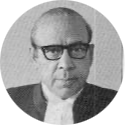M.H. Beg

M.H. Beg
Former Chief Justice of India
Assumed Office29th Jan, 1977
Retired On21st Feb, 1978
Previously
Enrollment1941
Judge of Allahabad High Court1963
Chief Justice of Himachal Pradesh High Court 1971
Judge of the Supreme Court 1971
Chief Justice of the Supreme Court1977
Profile
Justice Mirza Hameedullah Beg was enrolled in February, 1941 and practiced as an advocate of the Allahabad High Court from 1942. He practiced extensively as an advocate of the Federal Court of India in 1949. He served as standing counsel to Allahabad University and the UP Sunni Central Wakf Board. Beg J was then appointed as a judge of the Allahabad High Court on June 11th 1963.
In 1971, Beg J was appointed as the Chief Justice of the Himachal Pradesh High Court, and on December 10th, 1971, as a judge of the Supreme Court. He succeeded Justice Ajit Nath Ray as the 15th Chief Justice of India on January 29th 1977 and served for 13 months, before retiring on February 21st 1978.
During his seven year term in the Supreme Court, Beg J authored 194 judgments and was a part of 562 benches.
Beg J predominantly dealt with cases related to constitutional and criminal law. He also authored judgments on service law and property law.
Notable Judgments
In ADM Jabalpur v Shivkant Shukla (1976), popularly known as the habeas corpus case, the majority opinion of A.N. Ray, M.H. Beg, Y.V. Chandrachud, and P.N. Bhagwati JJ was that a writ of habeas corpus during a national emergency could not be enforced by a High Court. Beg J held that a right to enforce a personal freedom would be suspended for the duration of an emergency. A few months after the decision, Beg J was appointed as Chief Justice, superseding H.R. Khanna J.
Beg J presided over the nine-judge bench in Maneka Gandhi v Union of India (1978) which examined the scope of Article 19 and 21 of the Constitution. He authored the judgment and held that impounding a passport without following the procedure established by law violated Article 21. In addition, he stated that it was evident that Article 21 operated as shield against executive encroachment.
He was also on the bench of several other landmark constitutional matters including Kesavananda Bharati v State of Kerala (1973), where the Court held that Parliament does not have the power to alter the basic structure of the Constitution. In Kesavananda Bharati, Beg J delivered a minority opinion, relying on the broad powers granted to the legislature under Article 368 as well as the "test of consequences" to hold that the 24th, 25th and 29th amendment were valid.
In Bennett Coleman v Union of India (1972) certain media conglomerates challenged the limitations on the import of newsprint under Import Control Order, 1955. Beg J emphasized on the importance of freedom of press and held that restrictions on fundamental rights must satisfy the test of reasonableness.
Beg J passed away on November 19th 1988.
